Level down stress and level up performance with ‘Test Anxiety and Learning Styles’
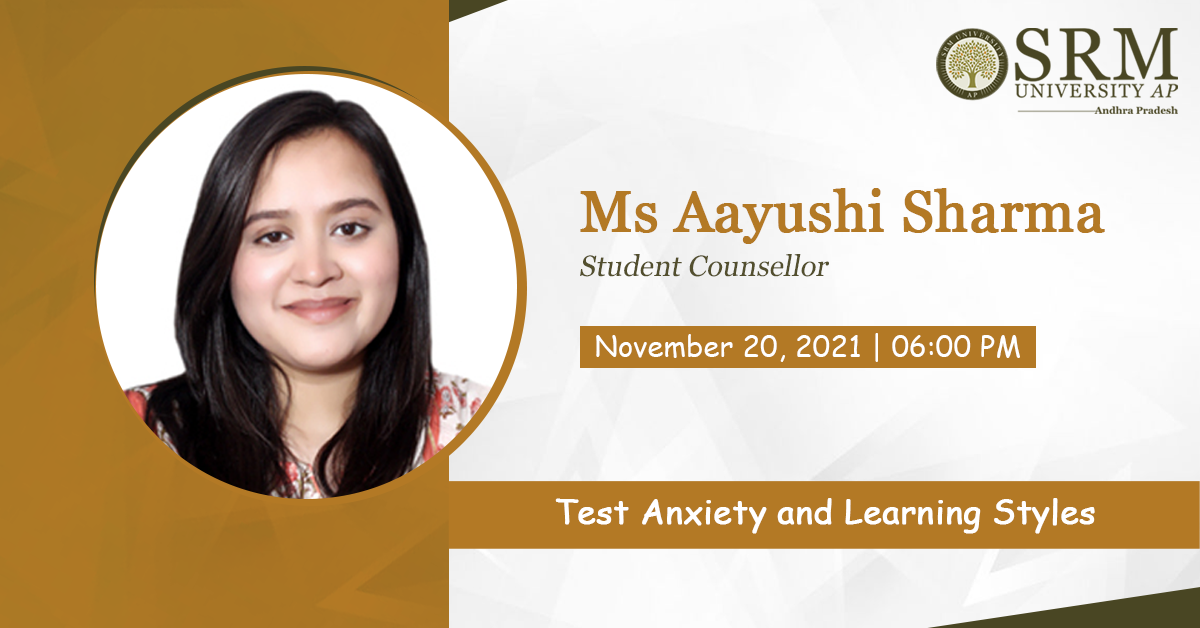 Ms Aayushi Sharma, the resident Student Counsellor, is bringing forth an exciting interactive session on Test Anxiety and Learning Styles on November 20, 2021, at 6.00 pm IST.
Ms Aayushi Sharma, the resident Student Counsellor, is bringing forth an exciting interactive session on Test Anxiety and Learning Styles on November 20, 2021, at 6.00 pm IST.
With exams facing this way, the cool season could get a little sweaty unless we learn to curb our stress and anxiety. So instead of dreading the ticking clock, it is time to command it. How well we perform in examinations will depend on how well we have understood our subjects.
An examination is not a comparison with our peers but an opportunity to self-assess. It can make us aware of our weaknesses so that we can work on them. It can also serve as a chance to assess our strengths so that we might build on them. Instead of looking at examinations with a pessimistic outlook if we look at them optimistically, we might even be able to use them as tools to help us as career guides.
So do not miss this riveting talk on November 20, 2021, at 6.00 pm IST to stay on track, focused and motivated.
- Published in Events, Students Affairs Events
Jairam Ramesh: On the journey of writing
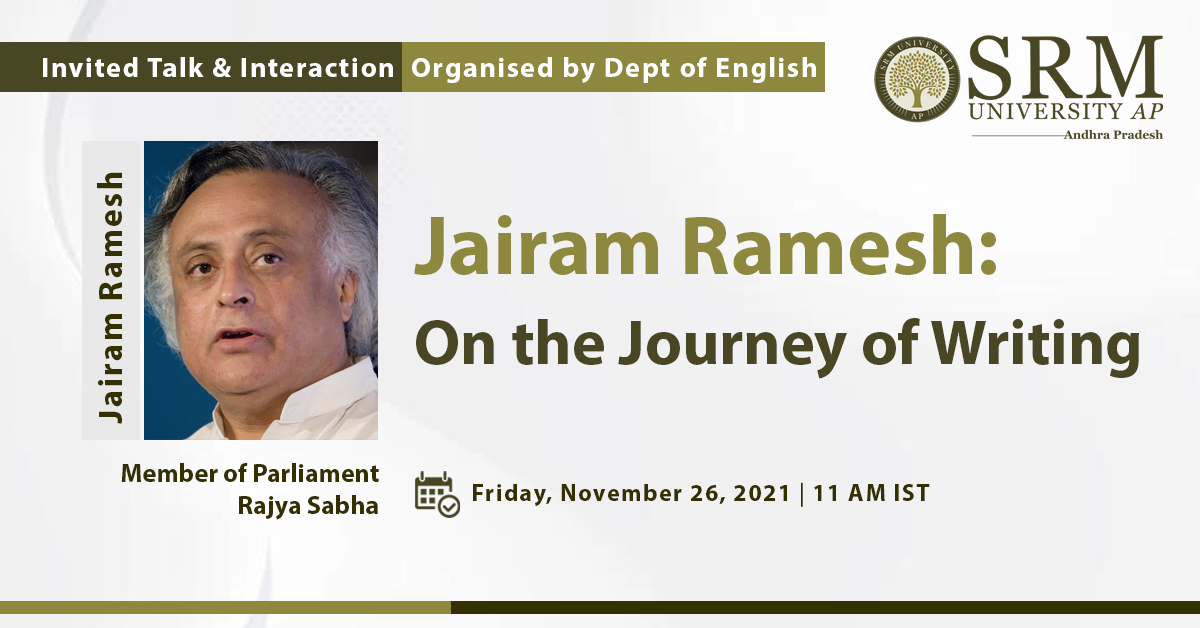 The Department of English at SRM University-AP invites you to an engaging webinar on November 26, 2021, at 11.00 am. Mr Jairam Ramesh, Member of Parliament representing the state of Andhra Pradesh, will be the guest speaker of the day.
The Department of English at SRM University-AP invites you to an engaging webinar on November 26, 2021, at 11.00 am. Mr Jairam Ramesh, Member of Parliament representing the state of Andhra Pradesh, will be the guest speaker of the day.
Writing is a process of pain and pleasure. Every writer approaches, experiences, and survives it in a unique way. In this talk and interaction, Mr Jairam Ramesh would share his idea and process of writing. His talk would be followed by an interaction about his latest book The Light of Asia: The Poem That Defined The Buddha (Penguin, 2021). The talk is intended to be a part of the Department’s larger initiative to organise interactions around “Language and Society” to address all kinds of conversations about language, communication, writing, speaking, thinking, and at a deeper level, about connecting with others.
About the Speaker:
Jairam Ramesh is presently a Member of Parliament and Chairman of Parliament’s Standing Committee on Science and Technology, Environment, Forests and Climate Change. He was Union Minister between 2006 and 2014 and held several portfolios including Commerce, Power, Environment and Forests, Drinking Water and Sanitation and Rural Development. He played a key role in global climate change negotiations in 2009 and 2010. He is also the author of several well-known books some of which are Green Signals: Ecology, Growth and Democracy in India, Old History, New Geography: Bifurcating Andhra Pradesh, To the Brink and Back: India’s 1991 Story, Indira Gandhi: A Life in Nature, Intertwined Lives: PN Haksar and Indira Gandhi, A Chequered Brilliance: The Many Lives of V.K. Krishna Menon and The Light of Asia: The Poem that defined the Buddha.
We encourage you to make use of this exclusive opportunity to interact with Mr Jairam Ramesh and understand the nuances of the writing process on November 26, 2021, at 11.00 am.
- Published in Departmental Events, English, English Current Happenings, Events, Webinars
Semester Abroad Programme at James Cook University, Singapore
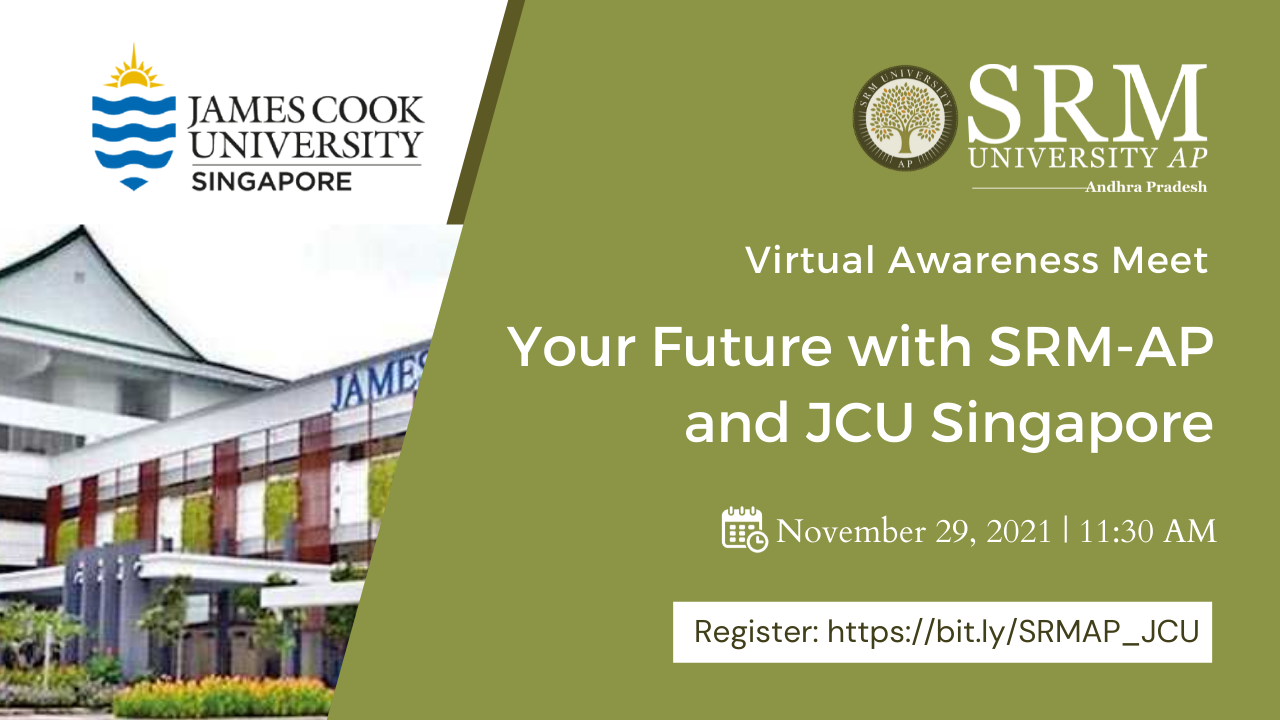 Discover top universities from around the world in the free virtual events organised by the Office of International Relations and Higher Studies, SRM University-AP! This time, we are organising an online awareness programme with one of our partner universities James Cook University (JCU), Singapore. Official representatives from JCU will do presentations on the Semester Abroad Programme offered to the students of SRM University-AP on November 29, 2021, at 11.30 am (IST).
Discover top universities from around the world in the free virtual events organised by the Office of International Relations and Higher Studies, SRM University-AP! This time, we are organising an online awareness programme with one of our partner universities James Cook University (JCU), Singapore. Official representatives from JCU will do presentations on the Semester Abroad Programme offered to the students of SRM University-AP on November 29, 2021, at 11.30 am (IST).
Studying at the Singapore campus of James Cook University allows exploring the rest of Asia along with their high-quality Australian education. The Semester Abroad Programme enables students to learn for 1 or 2 Trimesters (4 or 8 months), earning credits towards their home institution degree. As a Semester Abroad student at James Cook University, our students will be able to choose subjects from a wide range of study areas that will add value to their degree and broaden their experience.
From networking sessions to university fairs to seminars and panels, the Office of International Relations and Higher Studies is the ultimate way to find your way to study abroad! Stay tuned to this awareness programme on November 29, 2021, at 11.30 am (IST).
Destressing the anxious nerves with Test Anxiety and Learning Styles Session 2
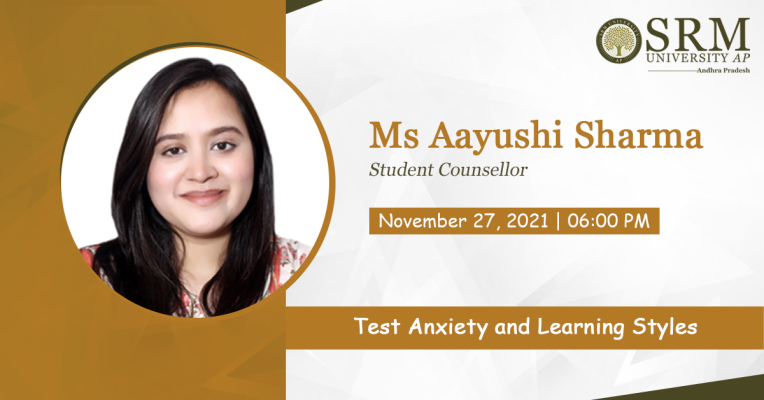 Shivering with the change of weather is welcome. Trembling with nerves is not. So, if the upcoming tests are making you anxious and jittery, then the second session of Test Anxiety and Learning Styles would be an excellent opportunity to take a deep breath before the sprint.
Shivering with the change of weather is welcome. Trembling with nerves is not. So, if the upcoming tests are making you anxious and jittery, then the second session of Test Anxiety and Learning Styles would be an excellent opportunity to take a deep breath before the sprint.
Ms Aayushi Sharma, Student Counsellor, will coordinate the session on November 27, 2021, at 6.00 pm. This session would be greatly useful to the students and help them understand how to use the benefits of tests to combat test anxiety. A test is more than marks and rankings. It is for finding gaps in our knowledge, for devising methods that work the best for us, and, most importantly, for learning management at the most basic interpersonal level so that we might transfer these skills to our professional lives one day.
Tune in on November 27, 2021, at 6.00 pm for an engaging, interactive and informative second session on Test Anxiety and Learning Styles with Ms Aayushi Sharma, to arm yourselves and head-on to the test tomorrow and the challenges ever after.
- Published in Events, Students Affairs Events
MSV-IV with Shaik Rajak
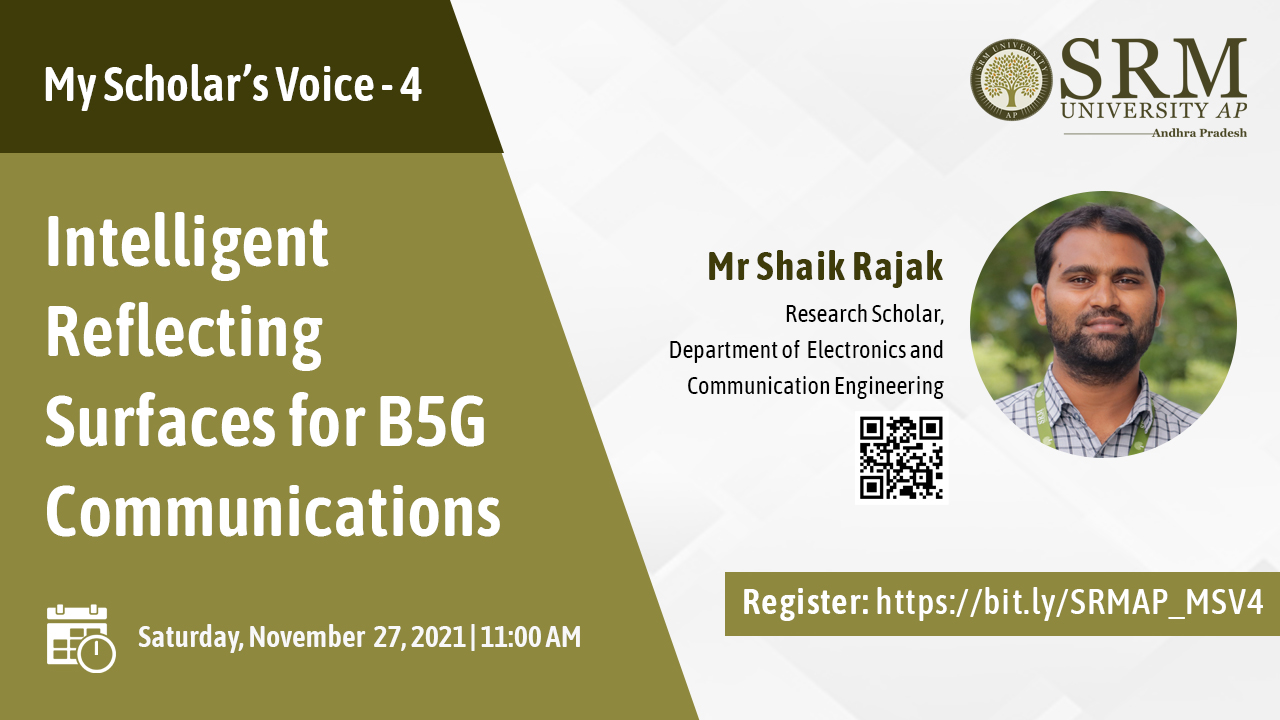 The world of communications is constantly changing. It is transforming, evolving, and becoming better, faster, and smarter. So, for the fourth edition of My Scholar’s Voice (MSV-IV) we would like to present Shaik Rajak from the Department of Electronics and Communications Engineering for a titillating discussion on “Intelligent Reflecting Surfaces for B5G Communications” on Saturday, November 27, 2021, at 11.00 am.
The world of communications is constantly changing. It is transforming, evolving, and becoming better, faster, and smarter. So, for the fourth edition of My Scholar’s Voice (MSV-IV) we would like to present Shaik Rajak from the Department of Electronics and Communications Engineering for a titillating discussion on “Intelligent Reflecting Surfaces for B5G Communications” on Saturday, November 27, 2021, at 11.00 am.
Shaik Rajak will give us an insight into the future with communications with his talk. He will elaborate in this session on the importance of his research. He will talk about the scopes of implementation as well as further research that can follow his work. It would be really beneficial to learn about the developing phase of communication research to make an informed decision while choosing research or career plans.
About the speaker:
Shaik Rajak received his B. Tech degree in Electronics and Communication Engineering from JNTU, Hyderabad in 2013. He completed his M.Tech. in Electronics and Communication Engineering, JNTU Hyderabad in 2016 and is currently working towards the PhD at the School of Engineering And Science (SEAS), SRM University-AP, Andhra Pradesh, India. Before joining SRM University-AP, he worked as a lecturer for a year in QIS College of Engineering and Technology (QISCET), Andhra Pradesh. He was awarded a gold medal for the paper presentation organized by SRM University-AP. His current research interests include the Internet of Things, beyond 5G communications, Intelligent Reflecting Surfaces, Millimeter-wave, Massive MIMO, OMA, and NOMA schemes.
So, take a seat and be a part of this amazing session on Saturday, November 27, 2021, at 11.00 am to hear from Shaik Rajak’s voice in MSV-IV.
- Published in Departmental Events, ECE Events, Events

